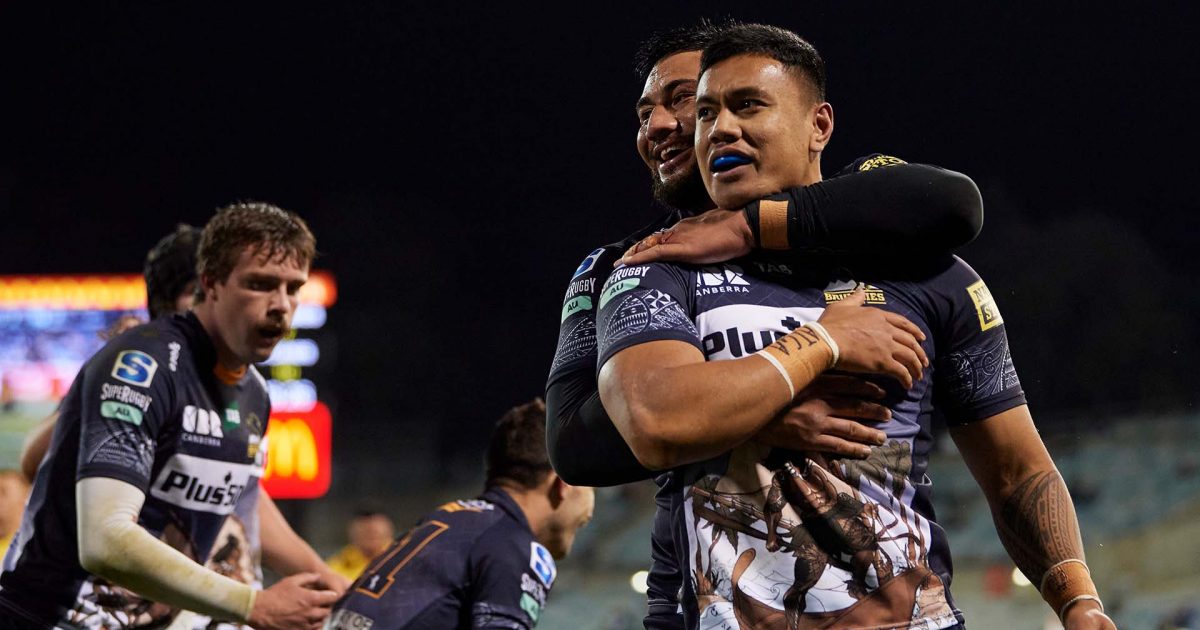How the Brumbies are preparing to shock the NZ Super Rugby sides

It’s no secret that Australia’s Super Rugby franchises have struggled to foot it with their Kiwi counterparts in recent years, but the Brumbies are looking to change that in 2022.
The Canberra-based outfit is hoping the dawn of Super Rugby Pacific will bring with it a change in fortunes this year after they fell to four losses from five matches against New Zealand opposition in Super Rugby Trans-Tasman last year.
They were one of only two teams, alongside the Reds, to register victories over Kiwi sides last year, with Australian teams enduring a dismal cross-border campaign that saw them win a collective total of two matches from 25 fixtures.
That poor return came after Australian clubs suffered an eye-popping winless run of 40 matches against New Zealand teams between 2016 and 2018.
Since that streak was broken, the Australians have still only sustained a win rate of just under 22 percent against Kiwi franchises, and that gulf in class was emphasised when Super Rugby Aotearoa and Super Rugby AU merged together in 2021.
Brumbies boss Dan McKellar is understandably eager for that to change, though. If his side are to stand any chance of challenging for the inaugural Super Rugby Pacific title, regular wins over New Zealand teams is non-negotiable.
How McKellar plans for those victories to come has been reflected in his revamped pre-season training programme, which he says has been altered with the aim of becoming “more powerful” in order to take down “the best teams in the competition”.
“It’s very different. Our approach to training is pre-seasons are always very tough here and it’s no different this year,” McKellar told reporters on Tuesday.
“Probably more focused this year on speed, agility, power, quality over quantity. Last year was a real conditioning focus, and I’m not saying that was right or wrong, but we’ve had a shift in how we train this year.
“The players have certainly appreciated that and we just feel that, as a team, we probably need to be a little but more powerful, especially against the best teams in the competition.”
McKellar’s quest to buck the trend of Kiwi dominance in Super Rugby – which won’t begin until round nine due to the Covid-enforced draw revision – has been aided by the fact that he has strong squad depth at his disposal.
In addition to the 14 Brumbies players who represented Australia last year, McKellar has also lured two former Wallabies, Jesse Mogg and Chris Feauaia-Sautia, to Canberra for this season.
That’s not including one-test midfielder Irae Simone or locks Cadeyrn Neville and Nick Frost, both of whom have been involved as non-playing members of the Wallabies squad over the past two years.
Former Waratahs and Australian Sevens speedster Cam Clark and All Blacks Sevens representative Ollie Sapsford have also come onboard, as has Manu Samoa playmaker Rodney Iona, giving McKellar plenty of options come selection time.
“I think a number of the new players that have fit in, that have come from other programmes or they’re getting their first opportunity, they’ve been really impressive,” McKellar said.
“We were just talking about it the other day as a coaching group. There’s genuine competition for spots across the board, which is what we need.”
With an overhauled training scheduled and a new personnel on deck, a sense of excitement is brewing in the Australian capital as the Brumbies continue to work towards their season-opener against the Western Force in Perth on February 19.
However, while spirits remain high within McKellar’s squad, the outgoing head coach maintained there is still plenty of work to be done if the Brumbies are to achieve their goal of toppling the best Super Rugby Pacific has to offer this year.
“We’re still working hard. It’s not like we’re fluffy by any means, but there is a different approach around quality and high-intensity and a real skill-based programme,” he said.
“I think there’s always a buzz at this time of the year. We’ve finally got the majority of the group back together again and everyone just enjoys being at the Brumbies and being around each other, so that’s pretty natural.
“But, I think the change in our approach to how we train has been really well-received.”



















































Words are cheap.